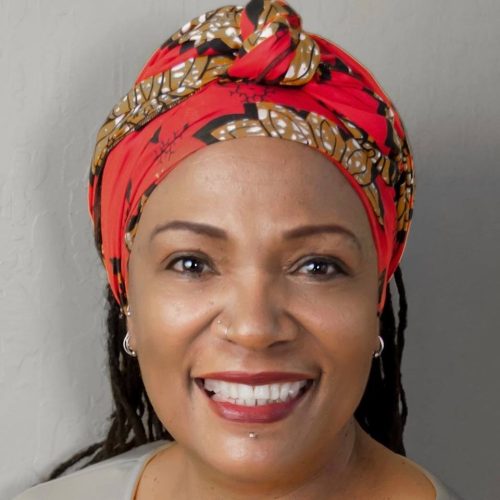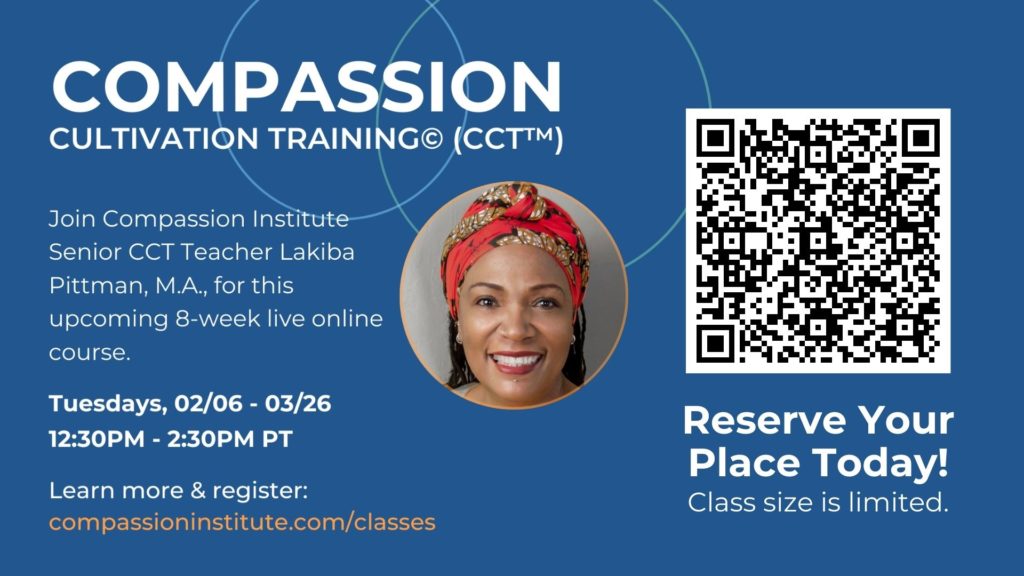Articles
What we’re contemplating, doing, and reading.
Senior CCT™ Teacher Spotlight: Lakiba Pittman, M.A.
We’re honored to have Lakiba Pittman, M.A. teaching Compassion Cultivation Training© (CCT™) courses at Compassion Institute, where she develops and delivers public workshops — including culturally-relevant, specialized workshops for a range of clients.
Lakiba was certified to lead CCT™ workshops by Stanford University’s Center for Compassion & Altruism Research & Education (CCARE) in 2014 and is a Senior Adjunct Professor at Menlo College and Notre Dame de Namur University. Additionally, Lakiba has trained with the Center for Mindful Self-Compassion, Mindful Schools, Mission Be, The Greater Good of U.C. Berkeley, The Center for Mind-Body Medicine, and The Dalai Lama Center for Ethics & Transformative Values @ MIT among others.
Read below to discover what else Tori Sarris — CI’s Program Manager, Public Programs — discovered about Lakiba and her deep wisdom around compassion in her interview for this special CCT™ Teacher Spotlight.
What drew you to the study and practice of compassion?
After 20+ years working in high-tech in leadership development and diversity work, I started my own consulting business and then got the opportunity to teach about leadership and diversity at a local college. One of the foundational points I taught over the years was the importance of cultivating cross-cultural competence and developing the ability to honor, listen to, and have compassion for one’s employees or peers in the workplace (i.e., the importance of learning to be a visionary, skillful, compassionate leader).
When I learned that Stanford created a Center for Compassion, I jumped at the opportunity to be involved because the program they were starting was looking at the science behind compassion as well as the potential of its power to build bridges and to help people develop a means to cultivate compassion over one’s lifetime. I went through their program and got certified to teach Compassion Cultivation Training© (CCT™). I also became trained in mindful self-compassion, mind-body medicine, and MBSR (Mindful-based stress reduction).
I really believe that compassion can bridge some of the differences and conflicts we see today — whether that be compassion for others, ourselves, or the planet and the environment.
How has compassion and compassion training impacted your work life or community?
Compassion is a foundational part of who I am, and I continue to learn more about it while consciously integrating it into my life. In some ways, we’re taught from a young age to care about others and ourselves, and in other ways, we’re taught to work for our own benefit. I’m talking about striving, accomplishing, and manifesting for our own good — and not so much for those that might be out of our “immediate circle of concern.”
In the work I do, and in my own life, I’m adjusting that a bit — meaning I feel that I am a part of everyone, and everyone is a part of me. That includes the good, bad, and the ugly. And if I can offer compassion to the world— which might come in a variety of ways — by spending a moment listening to a student who is struggling, listening to a friend who might be faced with a challenge, or even recognizing that I might be the one who is suffering and need some support.
There are underpinnings of compassion in all my work — at my college where I teach, workshops I do online or in-person, talks I give, and community work. It’s become a conscious part of my life and being, and I’m grateful for that. I’m not fully there, though — wherever “there” is. — I mean I’m still growing, challenged, cultivating, and will be for the rest of my life.
What component of CCT™ do I use most in your everyday life?
I would say it’s the notions of self-compassion and common humanity. Self-compassion can be challenging, yet I think my life changed when I was able to be my own best friend. When I really tuned in to what I needed, how I was doing, and what things I could do to be better, to feel better.
And another important component that is a part of my everyday life is “common humanity.” We really are very much the same at our base level. I latched onto the CCT™ saying, “Just like me” early on in my training, and I work to incorporate it more authentically and genuinely in my life. Again, we’re all very similar at the base level and, of course, dependent on our individual lives, experiences, social constructs we were raised with. And with all of the cultural, financial, mental, and spiritual variations, we can easily be at odds — which leads to, “I’m right, and you’re wrong.”
Compassion gives you insight at a deep level that this person that I might be judging, avoiding, or disagreeing with on some level is “just like me.” They started life with dreams and aspirations — perhaps with a soft heart and a dream — just like me. But life took us down different roads, and today, they’re in front of me, suffering in some way. I may not agree with their politics, or maybe they have caused harm in some way, but do I have the ability to have compassion for them anyway?. Well, this is something I’m still working on. I’m a work in progress.
I just want to bring healing to the edges of life, the edges that are hurting people or causing trauma. I want to be on the healing side of it — for myself, my family, my students, my friends, the planet, and everyone and everything.
You’re invited to join Lakiba Pittman for her 8-week online Compassion Cultivation Training© (CCT™) program — which starts February 6th.
Click here to find other upcoming Compassion Institute courses.




